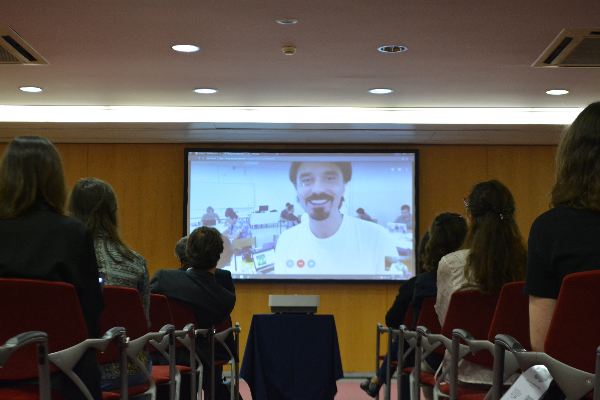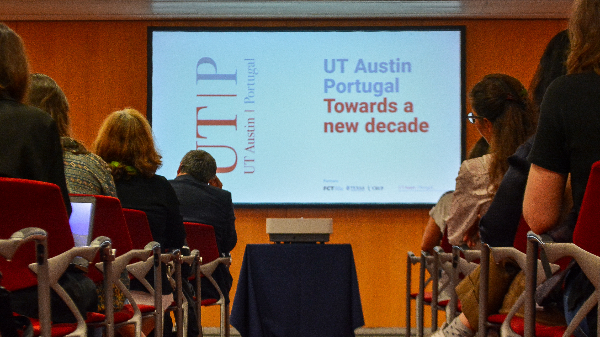UT Austin Portugal Program discusses new scientific areas for the next decade at Encontro Ciência 2018.
UT Austin Portugal Program was present at Encontro Ciência, the annual meeting of Portuguese researchers, that happened at Lisbon Congress Centre, from 2nd to 4th of July. The opportunities and challenges brought by the topics of the third phase of the Program were presented and discussed in the “UT Austin and Portugal – Emerging Challenges of Knowledge” session.
Opening the session, José Manuel Mendonça, the Interim National Director of the UT Austin Portugal Program, presented the five new areas for the partnership: Advanced Computing, Earth Interactions, Medical Physics, Nanotechnologies, and University Technology Enterprise Network (UTEN).
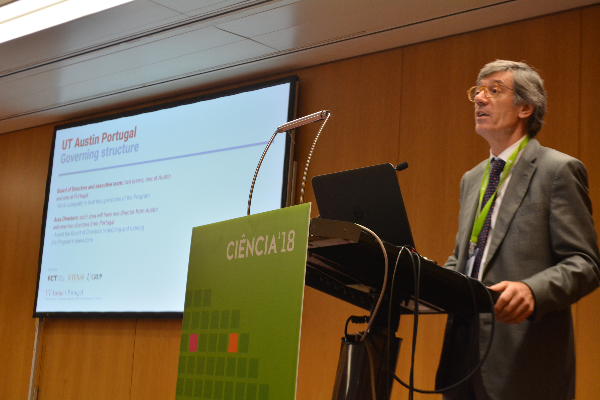
The goal for the next decade is “to build on past experience and engage in multidisciplinary research, strongly aligned with the strategy of the country in the different scientific and technological areas. There are big challenges and opportunities”.
“At UT Austin we have always found lots of enthusiasm, involvement, quick response, …, always with very good value for Portugal”, that’s why, to keep this good mood and cooperation “we have to continue to ask, to propose, to stimulate this fantastic community at Austin!”, José Manuel Mendonça concluded.
Adding value towards a more sustainable world
Various experts were invited in the Program key areas to show past and ongoing research that illustrates the relevance and growing activity of these emerging areas of knowledge, in Portugal and worldwide, and to promote the discussion with the audience.
In Advanced Computing, Paulo Mateus, from Instituto Superior Técnico (IST), has presented two projects he has been working on with Security and Quantum Information Group, at Instituto de Telecomunicações, about quantum data mining and modelling to solve security problems, like in elections, and powerful approximation distribution using medical data for diagnosis.
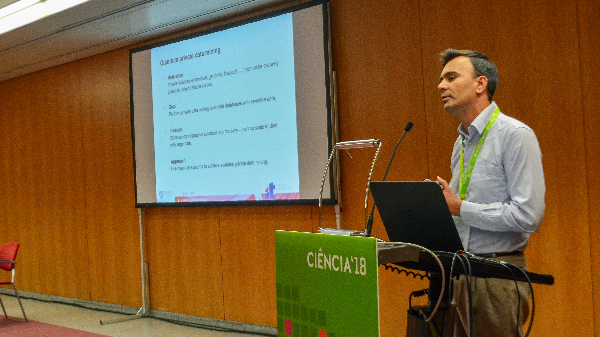
Cristina Freire and Paulo Freitas were the invited speakers to talk about the new world of Nanotechnologies and how it is aligned with some of the United Nations Sustainable Development Goals.
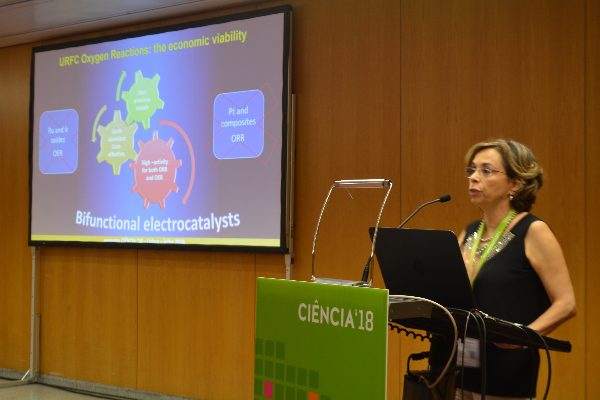
Professor at Faculty of Sciences of University of Porto (FCUP), Cristina Freire presented the projects UniRCell – Unitised Regenerative Fuel Cell for Efficient Renewable Energy Supply: from Materials to Device and FOTOCATGRAF – Graphene-based semiconductor photocatalysis for a safe and sustainable water supply: an advanced technology for emerging pollutants removal.
Paulo Freitas, Deputy General Director at International Iberian Nanotechnology Laboratory (INL), has shown three societal challenges in which Nanotechnologies are change contributors: health; food and sustainable agriculture; and automotive industry. “What we want is to generate more products and more companies to the market”, Paulo Freitas stated.
Following the best examples on health
On Medical Physics field, José Marques, from Technological and Nuclear Campus, has presented the challenges of developing a proton therapy center in Portugal, similar to the Proton Therapy Center at MD Anderson, at the University of Texas, leader in clinical research and development of proton therapy in the United States.
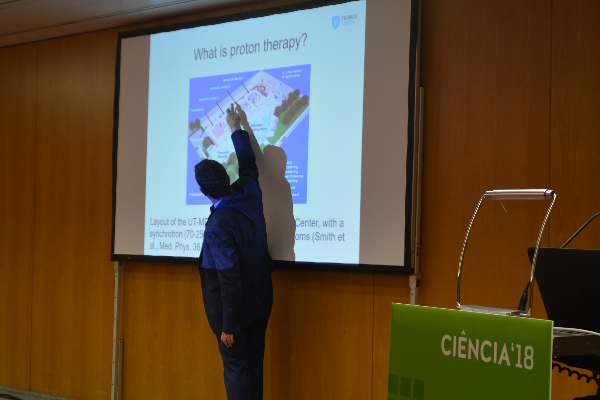
José Marques mentioned that there is a lot of work to be done to support the training of Portuguese physicians and physicists in this “advanced type of radiation treatment that uses a beam of protons to deliver radiation to a tumour, destroying cancer cells while sparing nearby healthy tissues”.
When the excellence goes to space
João Paulo Martins is a PhD researcher at Portuguese Institute for Sea and Atmosphere (IPMA), developing work in the field of Earth Interactions, and has explained the leading role of Portugal at Land Satellite Application Facility for Land Surface Analysis (Land-SAF), that delivers the European Organization for the Exploitation of Meteorological Satellites (EUMETSAT) satellites for land surfaces.
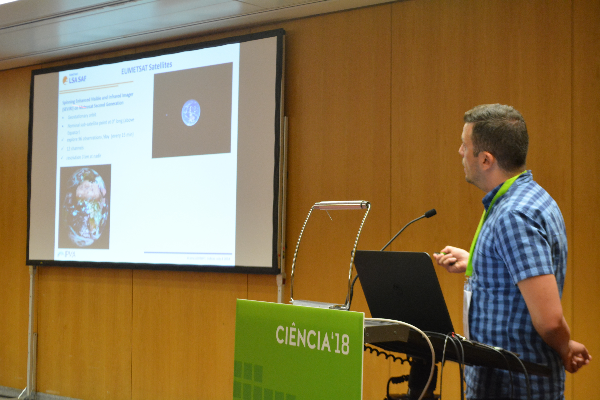
This “reference center for land surface remote sensing” goals are to “develop algorithms to maintain and improve the surface for current satellite missions and to ensure that the transition to the next generation of satellites is smooth, and to produce and distribute in near real time surface variables to users”.
Also developing space related tools, Nuno Rocha, from INEGI, brought to the audience the recent activity of INEGI on Advanced Composite and Structures for Space Application. INEGI covers “the full value chain of composite materials development, converting them into spacecraft products. Sometimes we find the need to develop new materials, new combinations”.
UTEN aims at keep supporting new technology-based companies
João Claro, President of the Executive Commission of INESC TEC and Associate Professor at Faculty of Engineering at University of Porto (FEUP), has presented the next steps for UTEN to achieve its main goal, “to prepare Portuguese researchers and innovators for scientific readiness for commercialization success”.
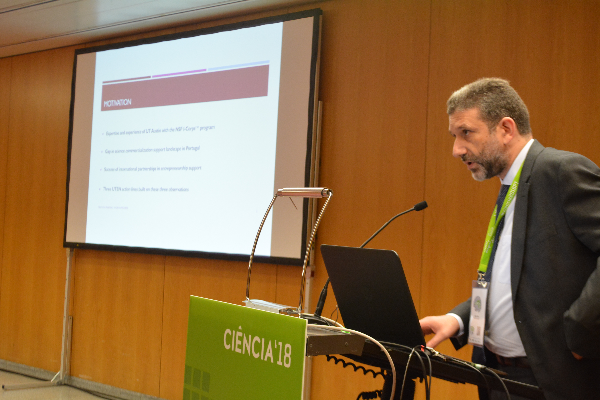
The first step will be to create a training program for tech start-ups, “PT- Corps”, inspired by the National Science Foundation (NSF) “i-Corps” program developed for the United States. “PT-Corps” will gather teams of 3 members each: a Principle Investigator, an Entrepreneurial Lead, and an Industry Mentor, providing them a seven-week training with face-to-face workshops and webinar sessions.
Mentoring and professional support will also be provided to the teams, as office hours for business development. Selected teams will have the opportunity to attend a two-week Customer Discovery Residency in Austin.
Ten more years to continue showing results
Vasco Varela, from PETsys – an industrial affiliate of the UT Austin Portugal Program, was invited to be the session moderator. Varela, who was also associated with Program in its first years, concludes “Looking 10 years backwards and 10 years forward, what I see is something unique in Portugal. Today, we can see the results ready, and that gives us the courage to continue. It is no longer just a belief”.
After the session there was a livestreaming demonstration from the Emergence – Digital Media Science Communication Hackathon, a 5-day intensive initiative that brings scientists, programmers, artists, and other kind of participants together to explore digital media technologies to communicate complex concepts in scientific research.
